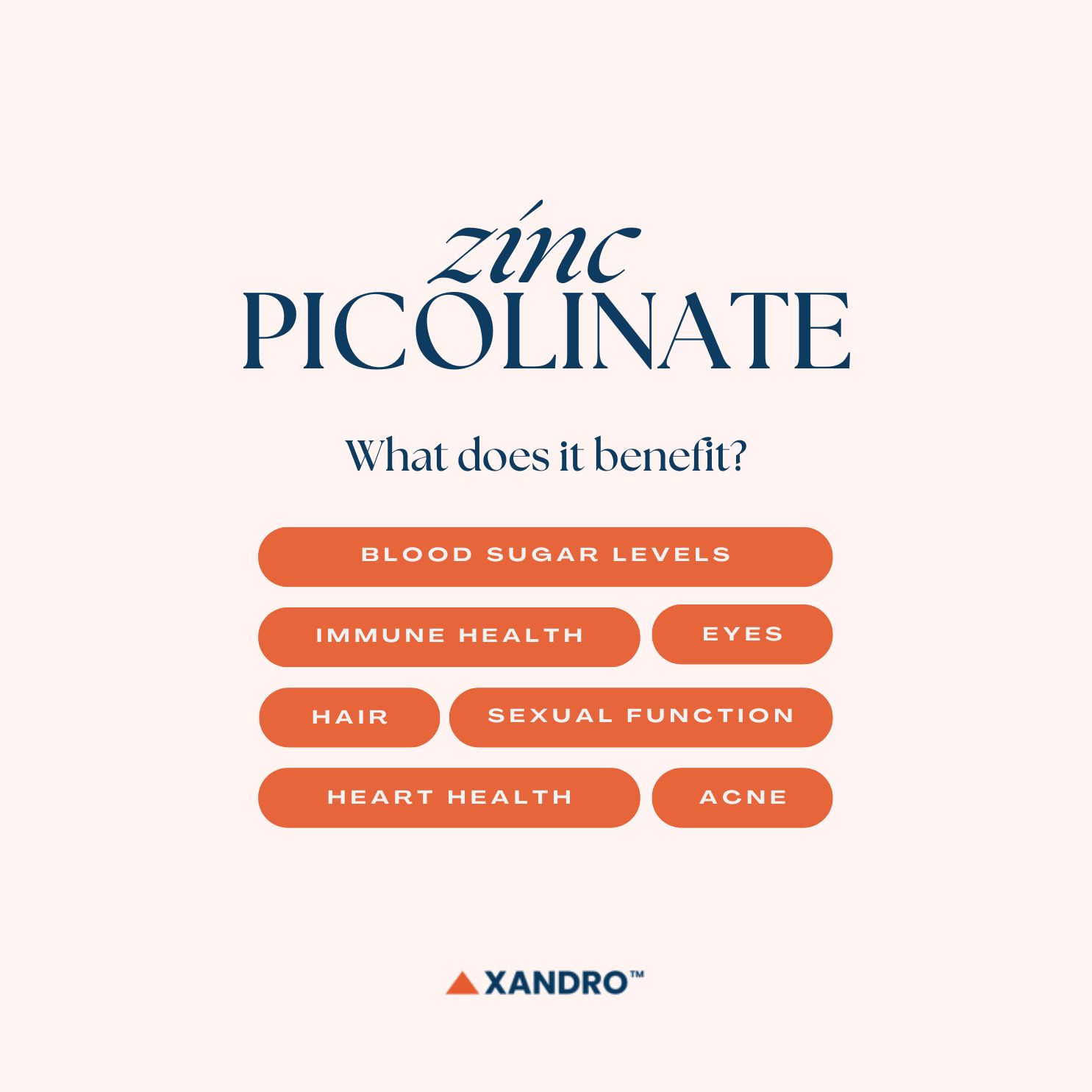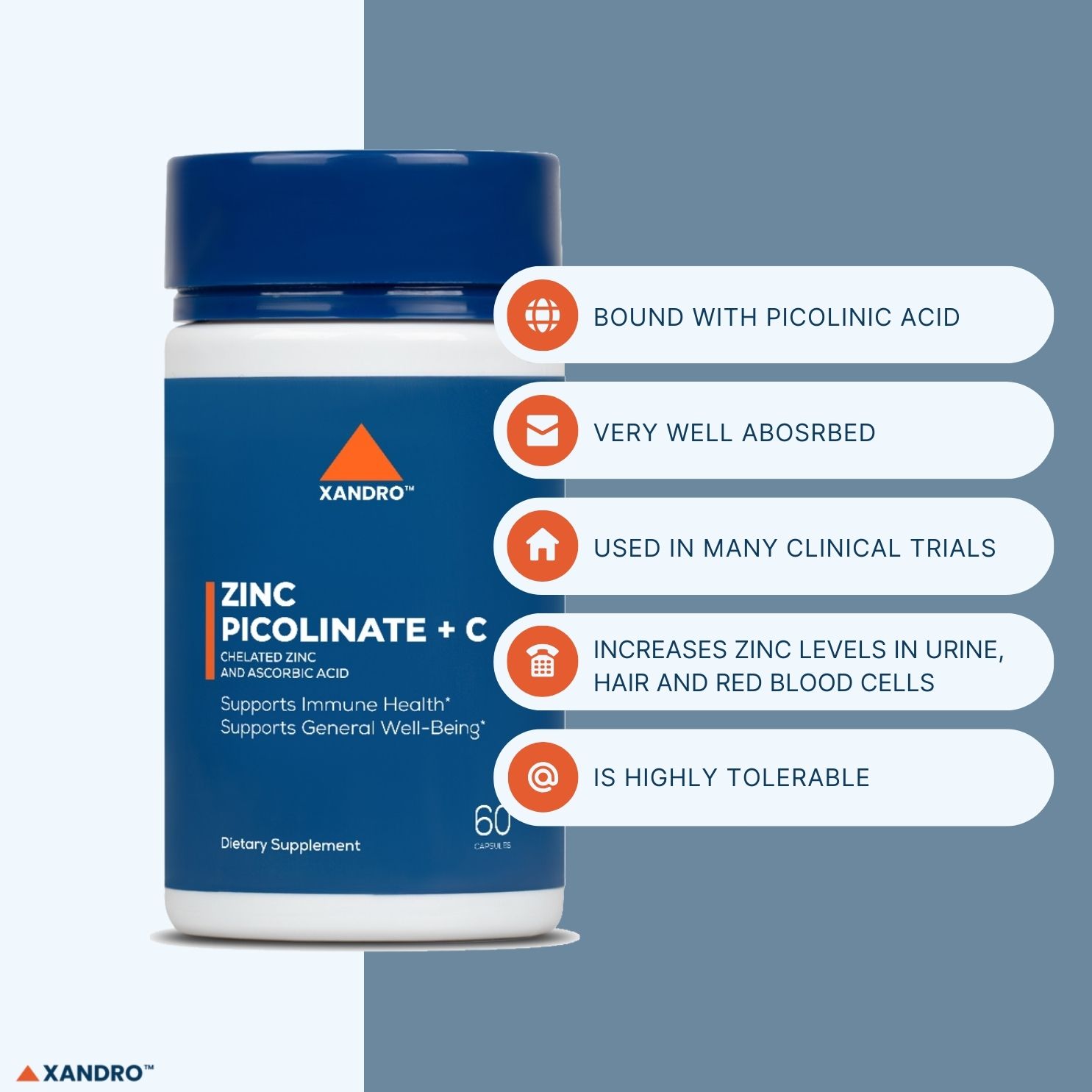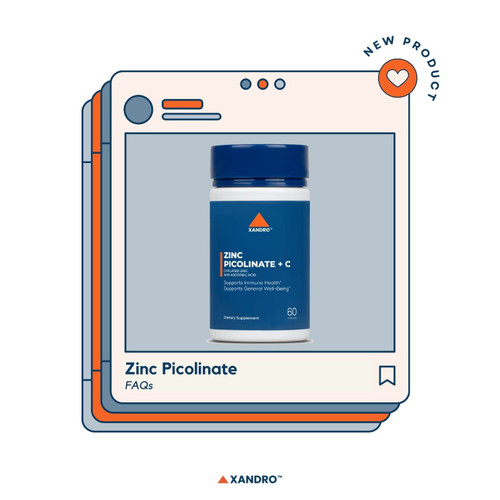FAQs About Zinc Picolinate and Its Benefits
20th Jul 2024
All About Zinc Picolinate: Common FAQs
Zinc vitamin is an essential trace element, meaning while we need it for many biological processes, we only need a small amount of it. Our bodies, however, cannot produce zinc on their own, so we need to consume it.
Zinc is needed for the proper function of nearly all processes in our bodies, such as the immune system, to produce anti-inflammatory mediators and to prevent inflammation. It also acts as an antioxidant, meaning it can help prevent oxidative damage and protect our cells against ROS and DNA damage. It’s also needed for our enzymes to be able to help with cell division, growth and wound health. In fact, it’s needed for more than 300 enzymes to function!
Is zinc picolinate better than zinc?
Zinc picolinate is a form of zinc supplement that helps it absorb well into the body. It’s still zinc, but being highly absorbable means it’s effective to treat and prevent zinc deficiency.
This article will cover zinc picolinate and its benefits, so jump there now:
- Zinc Picolinate Benefits
- What is the Difference Between Zinc Picolinate and Other Zinc?
- Zinc Picolinate FAQs
- Xandro Lab’s Zinc Picolinate + C
Improves Immune Health
You may have noticed that many medications include zinc. This is because it boosts your immune system and fights inflammation! It may even help certain infections, and it’s been shown to reduce the duration of the common cold.
Since zinc acts as an antioxidant, it may even reduce inflammation and protect against conditions like heart disease, diabetes and cancer as well as reduce the duration of certain respiratory tract infections.
Stabilises Blood Sugar Levels
Zinc is also needed to manage blood sugar levels and insulin release, which is the hormone that moves sugar from the bloodstream to tissue. Research suggests that low zinc levels may negatively affect blood sugar levels and type 2 diabetes, and may also help reduce insulin resistance, which helps your body use insulin properly.
Further Reading: Supplements for Diabetes
Improves Acne
People often take zinc for acne as it may improve skin health and treat skin conditions. Zinc sulphate, in particular, has been shown to lower mild to moderate acne symptoms. It’s been found that people with low zinc levels correlate with people with acne, and when they took zinc supplements, inflammatory bumps decreased.
Zinc picolinate’s high absorbency means that the zinc picolinate acne benefits include reduced swelling and redness, fewer breakouts and reduced residual acne scarring.
Improves Eye Health
Zinc supplements can be used to slow the rate of age-related macular degeneration and protect against vision loss and blindness, although, for greater results, this should be paired with other treatments, too.
Improves Heart Health
Zinc may also help improve risk factors for heart disease, as well as lower cholesterol and triglyceride levels. Some research that suggests zinc supplements may also reduce systolic blood pressure, too, although more research is needed.
Sexual Health
There are even benefits of zinc sexually. Zinc deficiency may be a cause of erectile dysfunction, so check with your doctor if you’re experiencing these symptoms. This has been found in both human and animal studies. Since low zinc levels also affect the sense of smell, this effect has also been shown to decrease libido. What’s more, zinc also plays a part in testosterone levels, as well as has a role in one’s ability to detect subtle chemicals that cause arousal.
Hair Health
So, are there any benefits of zinc picolinate for hair loss?
Zinc benefits for hair health, particularly those with low zinc levels, include helping to retain hair since a zinc deficiency can cause hair loss. This is because zinc helps maintain the structure of hair follicles in the scalp as well as helps in the regulation of keratin, a protein that forms the structure of hair strands. Zinc can also be used to treat dandruff!
Further Reading: Vitamins Found in Hair, Skin and Nail Supplements

Keep in mind that people who are on restrictive diets, have problems with their nutrient absorption or have certain health conditions may be prone to zinc deficiency. If you’re noticing your immune system is weak, hair loss, poor appetite, slow wound healing or diarrhoea, you may have a zinc deficiency.
If this is the case, speak with your doctor to get a blood test!
Zinc picolinate supplements can help increase your zinc levels, but let’s first go over some of the different types of zinc supplements.
Further Reading: Health Benefits of Zinc Picolinate
Minerals are not particularly well absorbed by the body, so their chelated form helps the body absorb the zinc. There are various forms of zinc, though, some of which are better absorbed than others, so let’s go over some.
Zinc picolinate vs zinc glycinate
These are the two most well-absorbed forms of zinc. One study showed that zinc bisglycinate (bound with glycine) has slightly better absorption than zinc picolinate, although this is an old study, but zinc picolinate has been clinically researched and has been used as a supplement for far longer.
Zinc picolinate vs zinc citrate
Zinc citrate is as absorbable as zinc gluconate, bound with citric acid, but it also has a less bitter and more appealing taste. When compared to zinc picolinate, though, zinc picolinate has superior absorption, with higher zinc levels found in red blood cells, urine and hair after supplementation, compared to no increase after using zinc citrate.
Zinc picolinate vs zinc gluconate
Zinc picolinate is one of the most absorbable forms of zinc and is bound with picolinic acid. It was found to absorb better than zinc gluconate. Zinc gluconate (bound with gluconic acid) is one of the most common forms of zinc, often found in lozenges and nasal sprays for the common cold. While zinc gluconate is one of the cheaper forms, one study found, like zinc citrate, it had no increase in zinc levels compared to significantly higher levels when taking zinc picolinate.
Other forms of zinc include:
- Zinc acetate: Bound with acetic acid and is often found in cold lozenges to speed up recovery and reduce symptoms.
- Zinc sulphate: Bound with sulphur, this helps prevent zinc deficiency as well as has been found to reduce the severity of acne.
- Zinc orotate: Bound to orotic acid and is one of the most common forms found on the market.
All in all, zinc picolinate has great absorption, efficacy and tolerability.

What are some zinc foods?
Some foods high in zinc include shellfish like oysters, crab and lobster, beef, pork and chicken, nuts and seeds like cashews and pumpkin and hemp seeds, oats, lentils, legumes and chickpeas, spinach, avocados, mushrooms, dairy, tofu and eggs.
Is zinc picolinate chelated?
Yes, for zinc to absorb well into the body, it needs to be bound to another compound, which, in this case, is picolinic acid.
Is zinc picolinate water soluble?
Zinc picolinate is slightly water soluble; zinc citrate is water soluble. While zinc picolinate can dissolve in water, it does so to a limited extent. This limited solubility is one reason why its absorption might be improved when taken as a supplement.
What is the best time to take zinc picolinate?
Take one capsule (or the recommended dose on the bottle, with food for best absorption and effectiveness. While it’s best to take it one hour before or two hours after meals, taking zinc on an empty stomach can cause nausea and diarrhoea. If stomach upset occurs take with a meal and speak with your doctor.
Who should not take zinc picolinate?
People who should avoid taking zinc picolinate include those with certain medical conditions like hemochromatosis (a disorder causing iron overload) or those taking certain medications that can interact with zinc (such as some antibiotics and diuretics). Pregnant or breastfeeding women should also speak with their doctor before taking zinc supplements. Also, if you consume a lot of fibre and soy protein, this can hinder zinc absorption in the body.
Can I take zinc picolinate every day?
Yes, you can generally take zinc picolinate every day, but it should be within the recommended daily limits.
For adults, the recommended dietary allowance (RDA) for zinc is typically around 8–11mg per day, depending on age and sex. Taking high doses of zinc over a long period can cause negative side effects, so it's important not to exceed the upper limit, which is 40mg per day for adults, unless you’re specifically told to by your doctor.
The dosage of zinc you take depends on your dietary intake and the foods you eat, as well as the type of zinc you buy. For example, Zinc sulphate contains 23 per cent of elemental zinc, meaning a 220mg supplement gives you about 50mg of zinc.
While zinc supplements are generally well tolerated, some people may experience side effects such as nausea, diarrhoea, vomiting and stomach pain. Since zinc can also affect your body’s ability to absorb copper, this can lead to a copper deficiency.
If you take antibiotics, speak with your doctor before taking zinc as they have been shown to interfere with each other.
Does zinc picolinate increase testosterone?
As mentioned above, there is some evidence that zinc can play a role in maintaining healthy testosterone levels, especially in individuals who are deficient in zinc. Keep in mind, though that zinc supplementation in those who already have sufficient levels of zinc does not necessarily boost testosterone. So, while zinc is important for testosterone production, taking zinc picolinate will not necessarily increase testosterone unless there is an existing deficiency.
Zinc picolinate supplements often include vitamin C, making them great for boosting your immune system and fighting colds. It's more effective for our bodies to take zinc picolinate, where the picolinic acid is already combined with zinc, rather than taking zinc and picolinic acid separately.
If you’re looking for one of the best zinc supplements, try out Xandro Lab's
Zinc Picolinate + C to experience the powerful benefits of this dynamic duo. It contains zinc picolinate 25 mg (25 mg zinc from 125 mg zinc picolinate), along with 250 mg of vitamin C to help with healthy immune function, wound healing, antioxidant support and collagen production!
